 Petzlover
Petzlover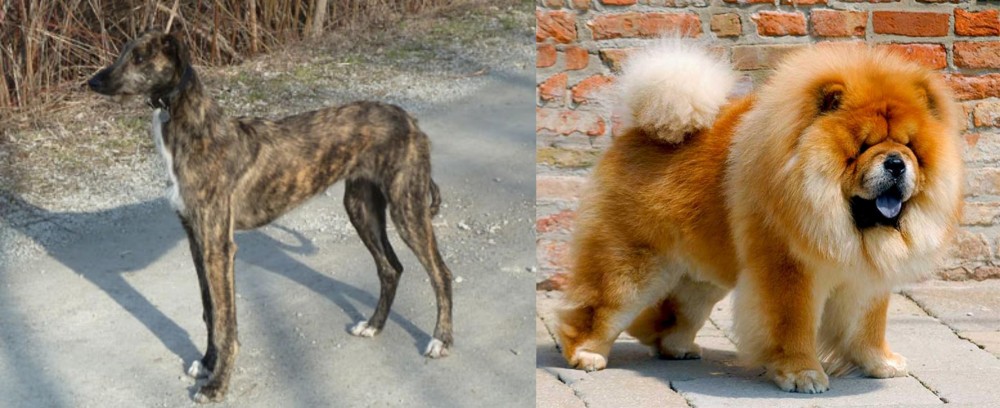 American Staghound is originated from United States but Chow Chow is originated from China. American Staghound may grow 26 cm / 11 inches higher than Chow Chow. American Staghound may weigh 9 kg / 20 pounds more than Chow Chow. Both American Staghound and Chow Chow has almost same life span. American Staghound may have less litter size than Chow Chow. American Staghound requires Low Maintenance. But Chow Chow requires High Maintenance
American Staghound is originated from United States but Chow Chow is originated from China. American Staghound may grow 26 cm / 11 inches higher than Chow Chow. American Staghound may weigh 9 kg / 20 pounds more than Chow Chow. Both American Staghound and Chow Chow has almost same life span. American Staghound may have less litter size than Chow Chow. American Staghound requires Low Maintenance. But Chow Chow requires High Maintenance
 The American Staghound is hunting dog and type of sighthound that is not recognized as a separate breed. They have historically been bred to hunt coyotes and then other game. Even though they are not considered a separate breed some of their breeding lines have existed much longer than some officially recognized breeds. The American Staghound is a cross between the Greyhound and the Scottish Deerhound. There was probably some Borzoi mixed in as well. The Staghound is believed to have traveled with General Custer across the American West.
The breed is a long-legged running dog with the speed of a Greyhound, the sighting ability of sight hounds and more endurance than any running breed. They are incredible athletes with amazing agility and have been bred to course game – coyotes mostly – and therefore are bred with a very intense prey drive. In the past they chased stags and deer and today they chase coyotes and hare. Coyotes are much faster than wolves and fight just as hard. The American Staghound is the only breed fast enough to track down the coyote. However, the breed is not recognized by the AKC.
Hunting with an American Staghound today is not very different from hunting with them in medieval times. Strict breeding practices and the non-commercialization of the breed has led to the almost perfect preservation of this hunting breed. They have not changed very much over the centuries. They have been breeding Staghound to Staghound since the early 1800’s. At times very, good hunting dogs from Greyhound and Deerhound stock are added to the mix. For hundreds of years now the closed breeding has led to what might be the finest coyote chasing sighthound possible.
The American Staghound is hunting dog and type of sighthound that is not recognized as a separate breed. They have historically been bred to hunt coyotes and then other game. Even though they are not considered a separate breed some of their breeding lines have existed much longer than some officially recognized breeds. The American Staghound is a cross between the Greyhound and the Scottish Deerhound. There was probably some Borzoi mixed in as well. The Staghound is believed to have traveled with General Custer across the American West.
The breed is a long-legged running dog with the speed of a Greyhound, the sighting ability of sight hounds and more endurance than any running breed. They are incredible athletes with amazing agility and have been bred to course game – coyotes mostly – and therefore are bred with a very intense prey drive. In the past they chased stags and deer and today they chase coyotes and hare. Coyotes are much faster than wolves and fight just as hard. The American Staghound is the only breed fast enough to track down the coyote. However, the breed is not recognized by the AKC.
Hunting with an American Staghound today is not very different from hunting with them in medieval times. Strict breeding practices and the non-commercialization of the breed has led to the almost perfect preservation of this hunting breed. They have not changed very much over the centuries. They have been breeding Staghound to Staghound since the early 1800’s. At times very, good hunting dogs from Greyhound and Deerhound stock are added to the mix. For hundreds of years now the closed breeding has led to what might be the finest coyote chasing sighthound possible.
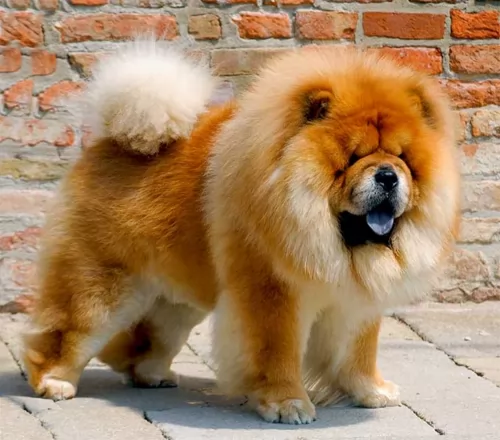 Northern China is the original home of the Chow Chow. In that region of China, the breed was known as the Songshi Quan – “the puffy-lion” dog. They have also been known in China as the “Dog of the Tang Empire” or the Tang Quan. The Chow is believed to be an ancient breed that the Foo Dog, or stone dog guardians of Buddhist palaces and temples, is modeled after. It is one of the most ancient of dog breeds that are still around today.
Northern China is the original home of the Chow Chow. In that region of China, the breed was known as the Songshi Quan – “the puffy-lion” dog. They have also been known in China as the “Dog of the Tang Empire” or the Tang Quan. The Chow is believed to be an ancient breed that the Foo Dog, or stone dog guardians of Buddhist palaces and temples, is modeled after. It is one of the most ancient of dog breeds that are still around today.
It is believed that they have existed for around 2000 years or perhaps even as far back as 3000 years, starting out in Mongolia and migrating to China. The ancientness of the Chow Chow has been validated through DNA testing. In China all those centuries ago, the Chow Chow was born to be a working dog. They hunted, herded, guarded and pulled carts. They went on quests with the Mongolian armies when China was invaded, as well as when the Mongolians invaded the Middle East and Europe later on.
Today’s Canadian Kennel Club has about 350 Chows registered while the AKC gets 10,000 new registrations every year.
 When you look at the American Staghound you can clearly see the Scottish Deerhound and the Greyhound lines. They have strong running muscles in their long legs and deep chest. He is of course a sight hound, so his vision is acute.
His running endurance is second to none. It is this endurance in running all day that makes the American Staghound difference from the Scottish Deerhound and the Greyhound. Yes, both the Deerhound are greyhound are great runners, but the American Staghound runs just as fast with an endurance level ten times that of the other hounds. His heavy bones structure and thick skin are also different from the other racing fast sight hounds.
When you look at the American Staghound you can clearly see the Scottish Deerhound and the Greyhound lines. They have strong running muscles in their long legs and deep chest. He is of course a sight hound, so his vision is acute.
His running endurance is second to none. It is this endurance in running all day that makes the American Staghound difference from the Scottish Deerhound and the Greyhound. Yes, both the Deerhound are greyhound are great runners, but the American Staghound runs just as fast with an endurance level ten times that of the other hounds. His heavy bones structure and thick skin are also different from the other racing fast sight hounds.
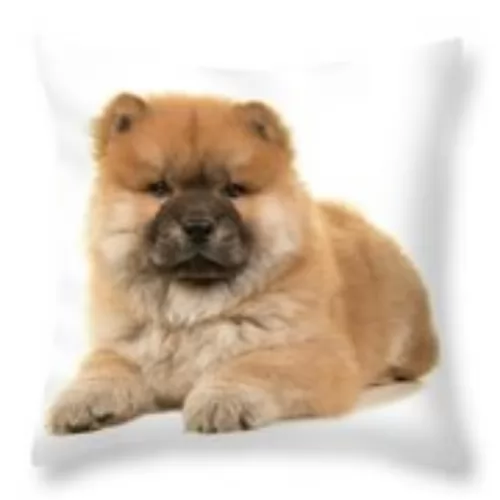 The Chow really does look like a small lion with a black tongue. The dog is sturdy and square with erect, small ears on a broad skull. They have a very dense double coat. Their eyes are deep set and look like almonds, while they all have that very distinctive purple or black tongue. Their lips are also distinctive with their blue color. The nose is black, but some Chows might have a blue nose. The tail is curly.
The Chow really does look like a small lion with a black tongue. The dog is sturdy and square with erect, small ears on a broad skull. They have a very dense double coat. Their eyes are deep set and look like almonds, while they all have that very distinctive purple or black tongue. Their lips are also distinctive with their blue color. The nose is black, but some Chows might have a blue nose. The tail is curly.
These are medium size dogs when it comes to height and weight, but they are powerfully built for their size. Their power is in their compact body holding the energy and strength of a much larger dog. Its hind legs are almost entirely straight, unusual for any dog. They get their lion appearance from the huge ruff that stands behind their heads. Their chest is broad and deep.
 This dog was bred to run fast and long after something it sees. They are not considered hyperactive but won’t live well in a confined space such as an apartment or condo. You will need a single-family house with a large yard. Though they are affectionate, family dogs, they are not cut out to be guard dogs. They are not especially protective or territorial, though they may bark at what they can see in the distance.
They are calm in their homes if exercised enough and great with children. They are often gentle and loving. They are pack oriented and accept other dogs, but they are not welcoming toward cats or other prey sized animals. Be careful with the AS around small children as he might knock them down or see them as prey as well. They consider anything smaller that runs to be prey.
When chasing prey, they are not only fast and enduring, they are tenacious and courageous. Remember that this is a breed that has been bred true in order to hunt and only in order to hunt. Their hunting instincts will override almost any other. Over the centuries only the best hunters were allowed to be bred so that only the best hunters would be born.
This dog was bred to run fast and long after something it sees. They are not considered hyperactive but won’t live well in a confined space such as an apartment or condo. You will need a single-family house with a large yard. Though they are affectionate, family dogs, they are not cut out to be guard dogs. They are not especially protective or territorial, though they may bark at what they can see in the distance.
They are calm in their homes if exercised enough and great with children. They are often gentle and loving. They are pack oriented and accept other dogs, but they are not welcoming toward cats or other prey sized animals. Be careful with the AS around small children as he might knock them down or see them as prey as well. They consider anything smaller that runs to be prey.
When chasing prey, they are not only fast and enduring, they are tenacious and courageous. Remember that this is a breed that has been bred true in order to hunt and only in order to hunt. Their hunting instincts will override almost any other. Over the centuries only the best hunters were allowed to be bred so that only the best hunters would be born.
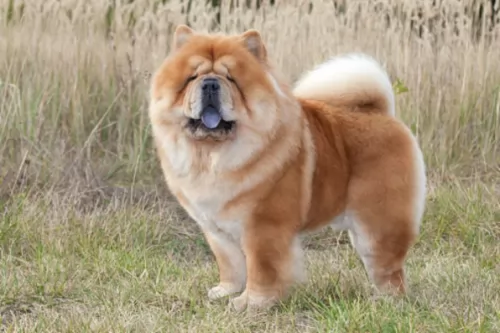 Loyal and true to their family and those they know; the Chow Chow is a little standoffish with strangers. They are very protective and usually attach themselves to one or two people. They are intelligent but stubborn, which can affect your training with them. They need to respect their people and Chows respect hose who take care of them. They can be aggressive toward dogs of their same sex especially if those dogs are the same breed as well.
Loyal and true to their family and those they know; the Chow Chow is a little standoffish with strangers. They are very protective and usually attach themselves to one or two people. They are intelligent but stubborn, which can affect your training with them. They need to respect their people and Chows respect hose who take care of them. They can be aggressive toward dogs of their same sex especially if those dogs are the same breed as well.
They are known to be very clean and many have compared them to cats in that regard. They appear to be dignified and refined. They are usually very quiet but very adaptable dogs.
 The American Staghound has been bred so consistently within the breed and true that they exhibit very few health problems. All running dogs are susceptible to joint issues, but the Staghound has less than most. Two issues they do face more often are a problem with anesthesia if they ever need it and the propensity to be vulnerable to bloat. Since they are a centuries old hybrid there are no real health issues born of genetics.
The American Staghound has been bred so consistently within the breed and true that they exhibit very few health problems. All running dogs are susceptible to joint issues, but the Staghound has less than most. Two issues they do face more often are a problem with anesthesia if they ever need it and the propensity to be vulnerable to bloat. Since they are a centuries old hybrid there are no real health issues born of genetics.
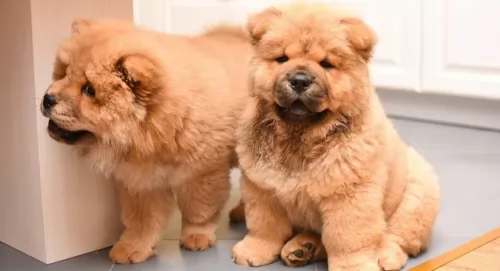 Although an ancient breed that obviously has survived many centuries of trials, the Cho Chow of today is prone to several different health conditions. These include:
Although an ancient breed that obviously has survived many centuries of trials, the Cho Chow of today is prone to several different health conditions. These include:
This condition can require surgery to keep the turning eyelid from injuring the eye ball.
This can cause lameness and arthritis.
This can cause lameness and arthritis.
Make sure you keep the ears clean and keep an eye on them.
 It is important that you don’t ever over feed you American Staghound as they are thin and bred to run. Even though they are heavier boned than their closest relatives, they are still very susceptible to obesity if overfed. The adult AS should be fed about 4-6 cups of dry food every day in at least 2 meals but 3 of more would be better. This will prevent bloat.
It is important that you don’t ever over feed you American Staghound as they are thin and bred to run. Even though they are heavier boned than their closest relatives, they are still very susceptible to obesity if overfed. The adult AS should be fed about 4-6 cups of dry food every day in at least 2 meals but 3 of more would be better. This will prevent bloat.
As previously mentioned there are no genetic issues with the health of the American Staghound. Bred for one reason and one reason alone for many centuries has led to this healthy state. Also, as stated previously they can have issues with bloat and anesthesia. The issue with anesthesia comes from the fact that the American Staghound has very little body fat to muscle ration. The issue with bloat or torsion can be avoided with many smaller meals and not running your Staghound right after they eat a large meal.
Of course, the American Staghound loves to run and if you are not going to hunt with her, you will have to find another source of vigorous physical activity. Every day from puppyhood on the AS must be stimulated mentally and physically in order to grow and mature correctly. He must have a home where the freedom to run is an everyday experience, not a dog park once a week. If you ride bikes, race walk or run on a daily basis this might be the dog for you. They obviously excel at games like lure coursing and can be good at agility.
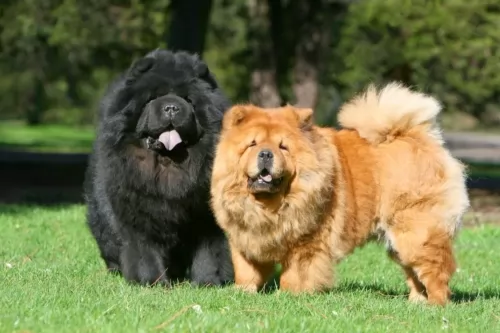 Don’t overfeed a Chow Chow as they are hard workers and big eaters. Feed them at least twice a day.
Don’t overfeed a Chow Chow as they are hard workers and big eaters. Feed them at least twice a day.
This eye disease can lead to blindness if not checked and treated.
These can be removed from an adolescent puppy.
Again, the Chow is susceptible to cancer.
Can lead to heart or kidney problems if left untreated.
Keep a close eye on your Chow Chow skin.
The Chow Chow was developed as working dog, but today’s version is more laid back and doesn’t need excessive exercise. Daily walks will suffice. They live very happily in the city if walked regularly. They are not really a competitive breed outside of obedience and confirmation. They are seldom seen in sports like agility or frisbee.